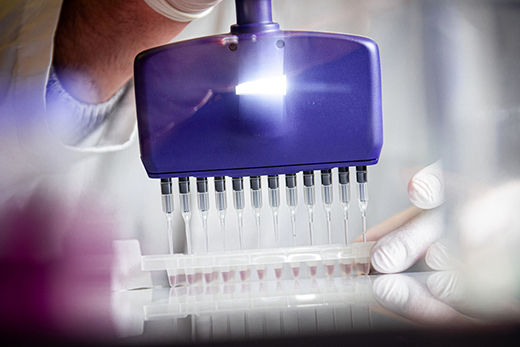New $3.43 million NIH grant to create core research facility at College of Veterinary Medicine
Friday, Oct. 1, 2021

A $3.43 million grant from the National Institutes of Health will help the Kansas State University College of Veterinary Medicine bring together five key laboratories that deal with infectious disease work into one research suite. | Download this photo.
MANHATTAN — Like a hub that connects the spokes of a wheel, the College of Veterinary Medicine is creating a new research center that brings together five highly focused laboratories at Kansas State University. The core laboratory is being made possible by a $3.43 million grant from the National Institutes of Health and will strengthen research efficiency and collaboration among K-State scientists and beyond.
The core-facility suite is the final element of a three-phase renovation at the College of Veterinary Medicine. Phase 1 delivered the Boehringer Ingelheim Auditorium adjacent to Mosier Hall — a 220 seat, contemporary educational space. Phase 2 became the Hill's Pet Health and Nutrition Center for clinical training and community service, which occupies the first-floor space created by deconstruction of the outdated, two-story auditorium. Phase 3, the 5,000-square-foot research laboratory, will occupy the second floor of the old auditorium space.
"This new core research facility strategically combines five key disciplines: animal model/pathology, molecular and cellular biology, microscopic imaging, flow cytometry and cell sorting, and next-generation sequencing," said Bonnie Rush, dean of the College of Veterinary Medicine.
The new research facility represents a critical component of the university's research infrastructure to support infectious disease studies. It will provide direct support of K-State's Center on Emerging and Zoonotic Infectious Diseases, or CEZID, which was created by an $11.3 million grant in 2020 through the NIH's Center of Biomedical Research Excellence, and nearby federal facilities in Manhattan that include the U.S. Department of Agriculture's National Bio and Agro-Defense Facility, or NBAF, and Arthropod-Borne Animal Diseases Research Unit.
"Kansas State University is poised to become the preeminent institution to advance the discovery and development of biosecurity strategies for emerging and zoonotic infectious diseases," Rush said. "With the upcoming deployment of the National Bio and Agro-Defense Facility next to our college, K-State will be the only U.S. university with a full continuum of biosecurity level-1 through biosecurity level-4 facilities co-located on one campus. The new core laboratory will be an important resource for non-containment research."
Currently, existing laboratories are isolated from each other, spread across three buildings and in some cases, hosted by individual faculty members, creating a burden for the host scientist and inefficient workflow for all parties, Rush said. Consolidating these individual facilities into a combined core will improve laboratory access, optimize research workflows and experimental outcomes, and provide coordinated training opportunities for students.
"This will give our university a modern biomedical research facility with advanced instrumentation and technical support to foster collaborative, transdisciplinary science across the university and beyond," Rush said. "This is critical to promoting a robust research and training environment where researchers can answer the most challenging and urgent biomedical questions of our time."
Rush said the latest NIH grant will support CEZID and collaborating scientists to advance the discovery and molecular characterization of infectious pathogens and diseases affecting animals and people. Projects within this new core research facility will bridge areas of excellence across K-State colleges that conduct STEM research. These projects examine cross-cutting themes, such as virulence factors and host-pathogen interactions of pathogens of significance for human health, employing in vitro systems and animal models."
The newly funded, core-facility suite will assemble state-of-the-art technologies in a single location to facilitate the delivery of coordinated services for academic, corporate and federal researchers in imaging and molecular analyses, providing a complete range of services from whole tissues to single-cell nucleic acid analyses. Currently, CEZID has collaborative partnerships with the University of Missouri, Columbia; MRI Global in Kansas City, Missouri; and regional pharmaceutical companies in the Kansas City Animal Health Corridor, such as Boehringer Ingelheim Animal Health in St. Joseph, Missouri, CEVA Animal Health in Lenexa and Elanco Animal Health in Overland Park.
Rush said the proposed plan is to complete renovation and then occupy the consolidated biomedical core facilities by the fourth quarter of 2023.
(Editor's note: The project as described in this announcement is supported by the U.S. Department of Health and Human Services, National Institutes of Health under Award Number C06OD031987. The content is solely the responsibility of the authors and does not necessarily represent the official views of the National Institutes of Health.)
